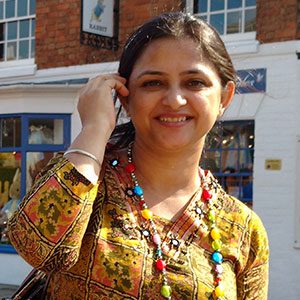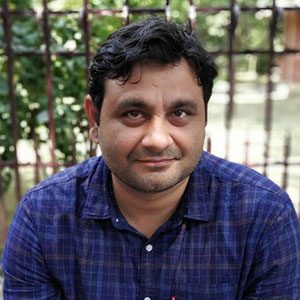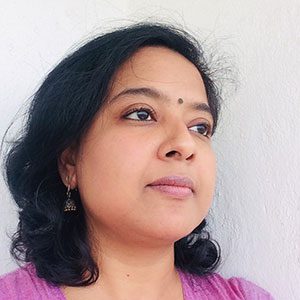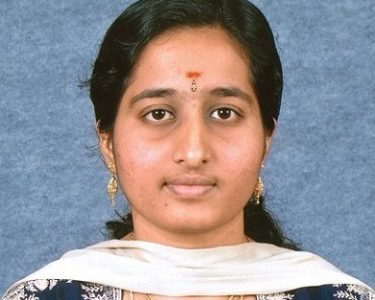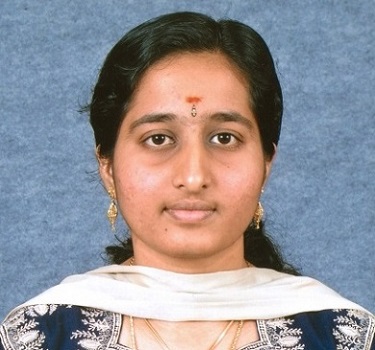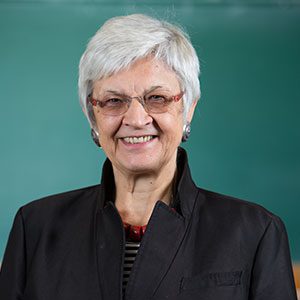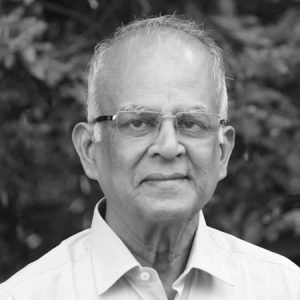Background:
PerminderJit Kaur is a Chemical Engineer working as a Senior Policy Fellow, jointly hosted at the Department of Science and Technology (DST), New Delhi and DST-CPR@IISc, Bangalore. After completing graduation and post-graduation in chemical engineering from Panjab University, Chandigarh, she did her PhD from IIT Delhi and received the “Professor Meera Madan Best PhD Thesis Award”. In her last assignment, she served as an Assistant Professor in the University School of Chemical Technology, Guru Gobind Singh Indraprastha University, New Delhi. The Mentor of Change program of Niti Aayog has given her a platform to inculcate scientific temper among school children.
As a Project Scientist in the Government of India’s Unnat Bharat Abhiyan, she worked on the village development plans. During DST’s women scientist scheme, she scientifically validated traditional bamboo treatment techniques, prepared a technology manual and transferred the technology to bamboo artisans. She works on policy research, managing biomass resources, valorisation of waste materials to achieve sustainable energy and the environment. With one book published on Sustainable Extraction of Metals from Waste Streams (Wiley publisher), 37 research papers and 12 book chapters, she is the Editorial Board Member and Reviewer for many International Journals.
Research Interests:
Perminder’s research interest is to develop a sustainable environment by valorising waste materials, particularly plastic and agricultural waste. She is working on using science, technology, and policy-based interventions to manage waste and generate valuable materials that can serve as a sustainable source of energy
Publications:
Book: 1
“Sustainable metal extraction from waste stream” by Wiley publishers. VCH, ISBN: 978-3- 527- 34755-1, G. Chauhan, Perminder Jit Kaur, K. K. Pant, K.D.P. Nigam.
Publications/Conferences: 37
1. Chitosan and graphene oxide-based nanocomposites for water purification and medical applications: A review, Khandegar V., Kaur P.J.,Channan P., 16 (4), BioResources 2021
2. Management of waste tyres: properties, life cycle assessment and energy generation. Environmental Sustainability (2021). Kaur, P.J.,Kaushik, G., Hussain, C.M. et al.https://doi.org/10.1007/s42398-021-00186-6
3. Efficient Catalytic Mineralisationof Bisphenol-A by Peroxymonosulfate Activated Spinel Nano-ferrites, Mandal, U., Kaur P.J.,Tanwar, R., Kumar, P. (2021) International Online Conference on Nano Materials (ICN 2021) Organised by Wroclaw University of Technology, Wroclaw, Poland & Gdansk University of Technology Poland &Wuhan University, China, Kerala (9-11 April2021)
4. Ofloxacin exclusion using novel HRP immobilised chitosan cross-link with graphene-oxide nanocomposite, Suri A., Khandegar, V., Kaur, P.J. (2021), Groundwater for Sustainable Development, Volume 12, February 2021,100515
5. Leveraging microbial wealth from rural resources for environmentally safe food production. Dashora, K., Kaur, P.J, Mishra, M. Fasake, V. (2018) International conference on agriculture and horticulture, Zurich,Switzerland
6. Bamboo availability and utilisation potential as a building material, Kaur, P.J., Forestry research and Engineering Journal, 2018, 2(5),240-242
7. Low cost Technology development for Mass scale Production of Podophylumhexandrum Royale, Kaur, P.J, M. Ojha, K. Dashora, Udiapur Conference Feb2018
8. Waste plastic to bio-diesel, The 3R International Scientific Conference on Material Cycles and Waste Management, 8-10 March 2017, NewDelhi
9. Eco-friendly preservation of bamboo: traditional to modern techniques”, Kaur, P.J.,S.Satya, KK. Pant, S.N.Naik, Bioresources (2016), 11 (4), DOI:10.15376/biores.11.4.Kaur
10. Field investigations of selectively treated bamboo species, Kaur, P.J.,KK.Pant, S. Satya, S.N.Naik, Springer, European Journal of wood and Wood Products, DOI 10.1007/s00107-016- 1055-9, online available, April,2016
11. Bamboo: The Material of Future, Kaur, P.J., S.Satya, K.K.Pant, S.N.Naik, International Journal Series in Multidisciplinary (IJSMR), 2016, 2(2), 27-34
12. Chemical characterisation and decay resistance analysis of Smoke treated bamboo species, Kaur, P.J., K. K. Pant, S. N. Naik, S. Satya, V. Kardam, available online, Springer, European Journal of Wood and Wood Products, DOI: 10.1007/s00107-016-1029-y, March2016
13. Characterisation of commercially important Asian bamboo species, Kaur, P.J., V. Kardam,
K. K. Pant, S. N. Naik, S. Satya, Springer, European Journal of wood and Wood Products, – Springer Publication, January 2016, 74(1), 137-139
14. Eco-Friendly Preservative Treated Bamboo Culm: Compressive Strength Analysis Kaur, P.J., S. Satya, K. K. Pant, S. N. Naik, International Journal of Chemical, Nuclear, Metallurgical and Materials Engineering, 2015, 9 (1), 43-46, Presented in London,U.K.
15. Comparison of Decay Resistance of Bamboo Treated with Plant Extracts and Oil Cakes, Kaur, P.J.,K. K. Pant, S. Satya, S. N. Naik, International Journal of Emerging Technology and Advanced Engineering, Volume 4, Issue 1, January2014
16. Scientific Investigation of Traditional Water Leaching Method for Bamboo Preservation, Kaur, P.J., V. Kardam, K.K. Pant, S. Satya, S.N. Naik, Bamboo science and Culture, The Journal of the American Bamboo Society, 2013, 23(1),27-32
17. Evaluation of decay resistance and fixation ability of catechu and boric acid based preservative for D. strictus bamboo species”, Kaur, P.J., KK. Pant, S. Satya, S.N.Naik,American Institute of Chemical Engineers (AIChE) Annual conference held in San Francisco, CA , USA, November 3-8,2013
18. Studies on Effectiveness of Bamboo Traditional Treatment Method “Vikaskardam, KK.Pant, Santosh Satya, Kaur, P.J.,P. Sudhakar published in the proceedings of 13th
19. International conference on “Non-conventional Materials and Technology”, September 22-24,2011, Hunan University, Changsha,China
20. Plant Extracts Based Eco-Friendly Treatment of Bamboo Species For Rural Housing, Kaur, P.J.,KK.Pant, Santosh Satya, S. N. Naik, published in 6th International Engineering and Construction Conference (IECC’6), by American Society for Civil Engineers held on June 28- 30, 2010 in Cairo,Egypt.
21. Study on Effectiveness of Traditional Bamboo Treatment Methods for Rural Housing, Kardam, K.K.Pant, Kaur, P.J, P. Sudhakar, published in 6th International Engineering and Construction, Conference (IECC’6), by American Society for Civil Engineers held on June 28- 30, 2010 in Cairo,Egypt.
22. Physico-chemical characterisation of cattle dung fibre under hydrothermal processes, V.Fasake, Kaur, P.J., Dashora, K., Reserach Square Preprint
23. Removal of Contaminants from Air and Water using Bamboo-based Green Adsorbents, M. Gupta, Kaur, P.J., S. Acharya, A. Jain, Sustainable Environment: Challenges and Opportunities, NIT Jalandhar, Sept 8-9,2021
24. Utilisation of bamboo charcoal for Biomedical Engineering, P. Yadav, Kaur, PJ..,V. Khandegar, A. Jain, Sustainable Environment: Challenges and Opportunities, NIT Jalandhar, Sept 8-9,2021
25. Bamboo for Rural Livelihood: Global to Local Perspectives, on August 31, 2021, Organised by National Institute of Rural Development & Panchayati Raj, North Eastern Regional Office, Ministry of Rural Development, Government of India.
26. Solid waste management in cities, Kaur, P.J.,Organised by IITD Alumni Association & Maharashtra Pollution Control Board, held on October 112020
27. Adsorptive Removal of Cadmium using Agro-residue, C. Tomar, V. Khandegar, Kaur, P.J., ICSISCET 2019, Gwalior, 02-03 November2019
28. Electrochemical treatment for removal of antibiotics from Pharmaceutical effluent,A.Suri,S. Acharya, Kaur, P.J., V. Khandegar, ICSISCET 2019, Gwalior, 02-03 November, 2019
29. Biosorption of Precious Metals from E-waste: Prospects and Challenges, Kaur, P.J.,Garima Chauhan, Geetanjali Kaushik, National conference on Environmental challenges for new India, Organised by Environment and Social Development Association (ESDA), Delhi
30. Fluidised Bed based Pyrolysis process for the production of fuel and value added chemicals from waste car tires, Kaur, P.J.,Geetanjali Kaushik, Environmental Challenges of India (Special Discussion on: Air Pollution & Smog in Delhi – NCR) organised by Environment and Social Development Association (ESDA)and CSIR, December 28,2017,
31. Integration of eco-friendly preservative and traditional knowledge for enhancing the service life of bamboo (a modern engineering material) in Young Scientists Conference as part of India International Science Festival, 4-8 Dec,2015
32. Eco-friendly preservation of bamboo species using tannin of Acacia catechu and Myrobalanterminalia, Perminder jit Kaur, K.K. Pant, S. Satya, S.N. Naik, Full paper accepted for 65th Annual Session of Indian Institute of Chemical Engineers CHEMCON, 27-30 Dec 2012 at NITJalandhar
33. पर्यावरणहितैषीपरिरक्षकभौतिकरासायनिकपरप्रभाव”International Conference- Hindi organised by DRDO and IIT Delhi, published in Jigaysa Journal IIT Delhi, Vol 27-28, 2013, 204-207
34. “भवननिर्माणसामग्रीएवममौसमवैज्ञानिक”, S. Satya, PerminderJitkaur, K.,K. Pant, S.N.Naik, Jigaysa Journal IIT Delhi, Vol-126, 2012.
35. “बांससंरक्षणप्रणालीऔरवैज्ञानिक”,Vikaskardam, K.K.Pant, Santosh Satya, PerminderJit Kaur, Jigyasa, Hindi Journal , IIT Delhi, Vol 25( 2011), 87-91
36. Eco-friendly treatment of bamboo species”in National Conference of Bamboo, organised by AFRI, Jodhpur, March 17, 2010
37. Review of preservation strategies wood, Young scientist conference, organised by MP Council of Science and Technology, Bhopal, Nov 2007.
Book Chapters Technology manual: 12
1. Biomass to liquid fuels: recent trends and techniques in catalytic conversions, Kaur P.J, Praveen Kumar, Shivani Chaturvedi, Biorefinery: A Sustainable Approach for the production of Biomaterials, Biochemicals and Biofuels (accepted for publication)
2. Utilisation of activated carbon obtained from biomass in waste-water treatment, Kaur P.J, Vinita Khandegar, Biorefinery: A Sustainable Approach for the production of Biomaterials, Biochemicals and Biofuels (accepted for publication)
3. Biomedical Applications of Algal Extract -Biosynthesied Silver Nanoparticles, Vinita Khandegar, Kaur P.J., Green and Sustainable Nanotechnology (accepted for publication)
4. Thermal Degradation of Plastic Polymers: Recent Developments, Kaur PJ, Mandal UK, Shah V., in book, Solid Waste Management: Chemical Approaches (accepted for publication) 2021
5. Biomedical applications of some green synthesised metal nanomaterials, in book Green Nanomaterials for Industrial Applications. Kaur P.J, Kaushik G., 2021, eBook ISBN: 9780128236222
6. Adsorptive Removal of Cadmium Using Agro-Residue, Tomar, C., Vinita, K.,Kaur, P.J. In book: Intelligent Computing Applications for Sustainable Real-World Systems, April 2020, DOI: 10.1007/978-3-030-44758-8_31
7. Properties and Importance of Various Bamboo Species for Multi-Utility Applications”.
Kaur P.J, Pant K.K., Kaushik G In: Sustainable Agriculture, Forest and Environmental Management. Springer, Singapore, June 2019. DOI:10.1007/978-981-13-6830-1_8
8. Ozonze: Applications in the Food Industry”, Singhal P, Kaur PJ, Chaturvedi S., Mechanism and Action, of Phyto-constituents, RPMP Vol. 31, page 169-176
9. Background material on Utility Products and Processes based on Panchgavya, Perminder Jit Kaur, Anushree Malik, January 2017
10. Technology manual of Bamboo Preservation, published by Ministry of Rural Development (MoRD) (both Hindi, English), March 2015
11. Green remediation of soil, using composting technique, Royal Society of Chemistry, The Handbook of Environmental Remediation, DOI:10.1039/9781788016261-00254, In book: The Handbook of Environmental Remediation: Classic and Modern Techniques. Publisher: Royal Society of Chemistry
12. Land farming: a green remediation technique, Royal Society of Chemistry, The Handbook of Environmental Remediation, DOI: 10.1039/9781788016261-00357. In book: The Handbook of Environmental Remediation: Classic and Modern Techniques. Publisher: Royal Society of Chemistry

